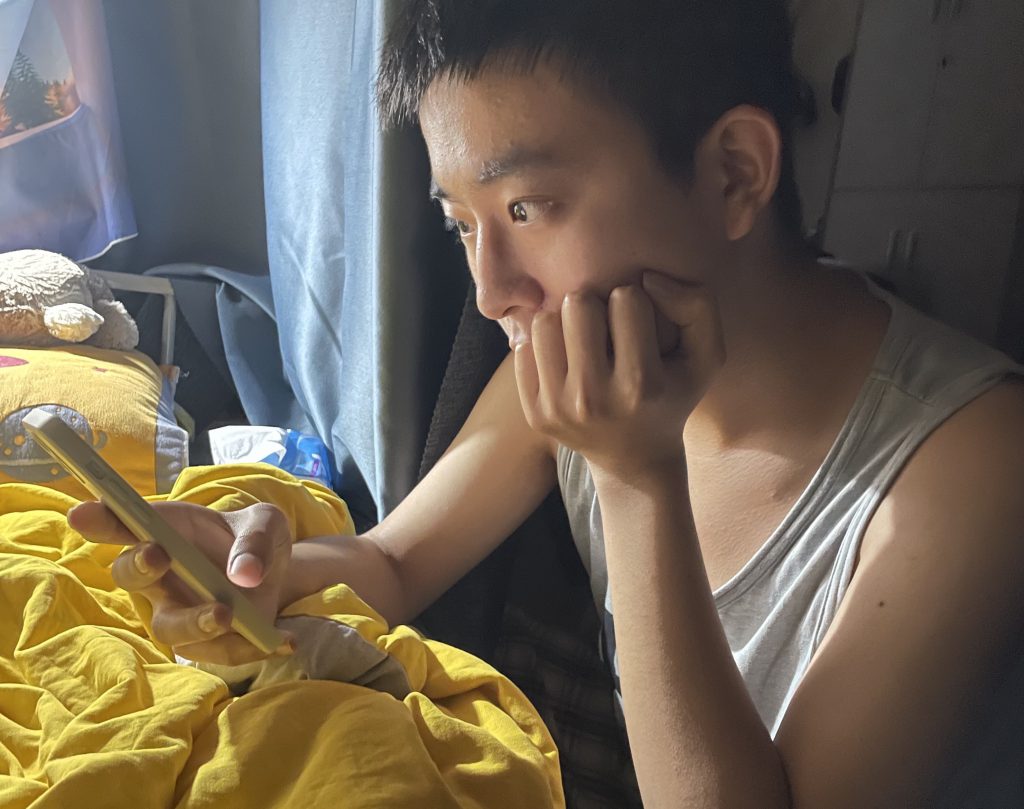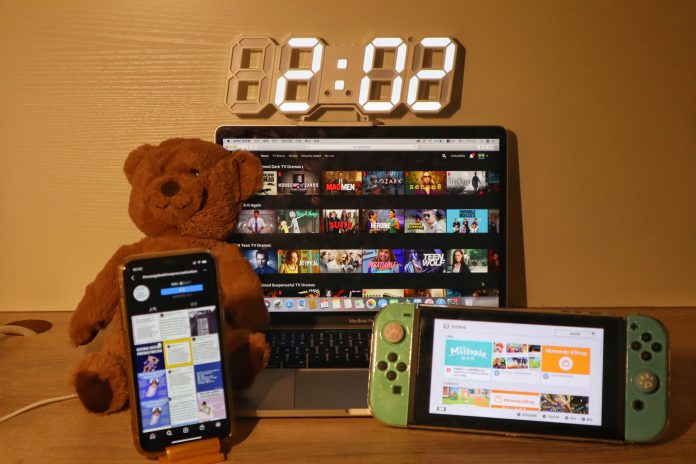By Glacier He
Many university students stay up for leisure to make up for their “lost daytime”.
Going to bed after 3 a.m. every Saturday is common for Cao Yibo.
Staying up late, playing video games, watching videos or just swiping his smartphone aimlessly are the getaways for the Year Two student majoring in business administration at Guangxi University.
Some of his classmates in his dormitory do the same.
“Our class schedule is tight on weekdays. So, after a long and tiring week, we need a break during weekends,” the 19-year-old student says.
“Revenge bedtime procrastination is making up for my busy daytime. I can only have some ‘me time’ during late night hours,” Cao adds.
“Revenge bedtime procrastination is making up for my busy daytime. I can only have some ‘me time’ during late night hours.”
Make Up For the Mentality
“Revenge bedtime procrastination” refers to a phenomenon that people who have to study or work during daytime and stay up intentionally to enjoy some freedom.
“I started staying up late when I was in middle school. It was a boarding school and I could not surf online at school. So, whenever I had holiday, I stayed up late to check all the news and entertainment shows I missed during school days,” Cao says.
“It is often quiet at night. No one would bother me. I just think that I must have some ‘me time’ and make good use of it,” he adds.
Cao thinks this habit brings him more good than harm.
“I may have black rims around my eyes and hair loss, but I think it is worthwhile. It makes me feel relaxed, peaceful and relieved. I can think many things about myself or just order a food delivery to please myself,” Cao says.

The pandemic also has had impacts on university students’ sleeping time.
Chinese Sleep Research Society published a white paper (2020全民宅家期間中國居民睡眠白皮書)on the sleeping habits of Chinese residents during the lockdown period on March 14, 2020.
The study was based on data from 2,004 participants who responded to a sleep questionnaire between January 1, 2020 and February 29, 2020. And Chinese Sleep Research Society found that people’s sleeping time was delayed by two to three hours during the pandemic.
“I have to stay at home most of the time and have nothing to do during the pandemic. That makes me feel anxious,” Cao says.
“Because of my anxiety, I go to bed much later even though I am not as busy as at school,” he adds.
“Because of my anxiety, I go to bed much later even though I am not as busy as at school.”
A Common Behaviour
Cao is not alone. This kind of work and sleep pattern is common among young people in China now.
Huami Corporation, a technology company that provides health services, released a report based on sleep health data on Xiaomi Sports App and more than 100,000 online questionnaires in 2019.
The report found that among Chinese people who stay up, 43 per cent were born in the 1990s and 27 per cent were born in the 2000s.
Liu Ziqi, a student majoring in financial technology at the Chinese University of Hong Kong, is also one of those who stays up.
“Sometimes I work on my assignments till midnight. Then I sit on my bed starting to swipe my phone. I know I do not really have anything important to do. But I just do not want to sleep,” the 20-year-old says.
“I know I do not really have anything important to do. But I just do not want to sleep.”
Liu says she stays up late because she is busy during daytime and she cannot have a good rest.
“When I try to relax during daytime, I do not feel at ease because I still have other things to do. But at night I just feel time is unlimited and I have more freedom,” Liu explains.
But going to bed late is not always enjoyable for Liu.
“Actually, I do not feel good after staying up late. I feel sleepy and tired the next day. Things I do at night are boring. But I just do not want to close my eyes,” she says.
The university student also feels anxious and guilty when she stays up late.
“I find it difficult to get up the next day, and feel super uncomfortable both mentally and physically,” Liu says.
“I have tried to change my lifestyle and wish to go to bed earlier but it is so hard to control myself,” she adds.

Find A Way Out
A mental health teacher at Beijing Polytechnic (Vocational College for Electronic Science & Technology), Zhu Xiantao, thinks university students stay up because they are anxious about their study and future.
“But going to bed late may lead to a vicious cycle. It is not a useful way to handle anxiety. They may feel more anxious and stay up even longer in the long run,” she says.
“Going to bed late may lead to a vicious cycle. It is not a useful way to handle anxiety. They may feel more anxious and stay up even longer in the long run.”
Zhu thinks one important way to solve the sleeping problem is to identify reasons behind their anxiety.
She suggests that students can talk with their peers or seek help from professionals such as psychologists to know why they feel anxious and stay up.
“The behaviour of revenge bedtime procrastination is also influenced by people around you. Maybe you and your friends can make a promise and supervise each other to form a habit of going to bed early,” she says.
Edited by Alice Wang
Sub-edited by Patricia Ricafort







































